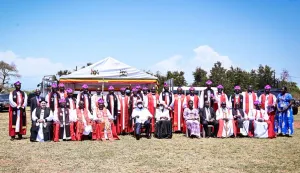
In Kabarole District, a group of young people has turned to beekeeping as a way to combat unemployment and improve their livelihoods. They operate under the Bulhalho Foundation in Nyakitokoli Parish, Karangura Subcounty.
Bulhalho, which means “bridge” in Rukonjo, was founded in 2017 in response to the violent ethnic conflicts that erupted in the Rwenzori region in 2014. These clashes, largely carried out by unemployed youth affiliated with the Rwenzururu Kingdom, left over 100 people dead across Bundibugyo, Kabarole, Kasese, and Ntoroko districts. The violence reflected longstanding rivalries between the Batooro, Bakonzo, and Bamba over cultural and political representation in the region.
According to Yonah Masereka Kikora, the founder of Bulhalho Foundation, many of the youths involved in the conflicts “had no jobs and were idle, making them easy targets for mobilisation into illegal activities.” To prevent such scenarios from recurring, Bulhalho was established as a rehabilitation model aimed at re-mobilising youth, promoting coexistence, and equipping them with practical skills for sustainable livelihoods.
With support from Bees Abroad, the German Embassy, and Operation Wealth Creation (OWC), the foundation began training youth in income-generating activities. Masereka explains that beekeeping was chosen because “it is lucrative, requires minimal start-up capital, demands little supervision, and can be done alongside other daily activities.”
The initiative initially trained 45 youths, most of whom were former Rwenzururu royal guards who had surrendered to the government. As the program gained visibility, unemployed youth from surrounding communities also joined. By 2018, honey production had increased, but a lack of markets led Bulhalho to establish a honey collection and processing centre to collectively process, package, and sell honey.
Today, the foundation has grown to 512 members organized into 19 beekeeping groups, producing at least 40 tons of honey annually. In addition to honey, they also produce wax, propolis, and manufacture beekeeping equipment such as smokers, bee brushes, hives, and harvesting overalls. To broaden opportunities, the foundation introduced other vocational skills including carpentry, hairdressing, bricklaying, concrete practice, welding, tailoring, and knitting. Trainees are assessed and certified by the Directorate of Industrial Training (DIT), enhancing their chances of employment and self-reliance.
Masereka says the initiative has shifted community mindsets. “People now know they can start something small, with little effort, and still earn from it. Even domestic violence has reduced because families now have income. Women and children own their own beehives and no longer depend entirely on others,” he explains.
Residents attest to the benefits. Boniface Manyindo of Kihwera Village says beekeeping has supplemented his income and enabled him to pay school fees for his children. “I currently have 25 beehives and harvest about 60 kilograms of honey every three months. I sell each kilogram at 10,000 shillings,” he adds.
Ronald Nyama says he earns over 400,000 shillings per harvest from his apiary, using the income to educate his children and support his siblings. He encourages youth who did not pursue formal education to “embrace practical skills that can help them become self-reliant.”
Evas Natukunda notes that beekeeping has improved her livelihood because “it is easy to manage, requires little supervision, and allows her time for other work, such as farming.” She encourages other women to take up the practice. John Birungi, an elder in Karangura Subcounty, believes that such skills “keep youth busy and earning, helping to reduce unemployment and school dropouts.” Nicholas Eribankya, a trainer under the program, adds that beekeeping has also enhanced crop yields due to increased pollination.
The project has since expanded beyond Kabarole to districts including Kasese, Kyenjojo, Ntoroko, Kamwenge, and Kitagwenda. However, Masereka notes several challenges, including expensive honey-processing equipment, high taxes on imported tools, and the spraying of crops with pesticides, which affects honey quality and bee populations. Other obstacles include market access difficulties, bush burning, deforestation, and policies penalizing beekeepers when bees sting people or animals.
Despite these challenges, beekeeping remains one of Uganda’s most underutilized economic opportunities. According to a 2023 report by the Ministry of Agriculture, Animal Industry and Fisheries, Uganda produces 4,000 metric tons of honey annually, with about 1.2 million people engaged in beekeeping.
Youth unemployment remains a pressing issue. The 2024 National Population and Housing Census shows that unemployment among young people aged 18–30 is estimated at 16.1%, while 42.6% of those aged 15–24 are neither in employment, education, nor training.













Chrispus Mutaahi
Leave a Comment
Your email address will not be published.